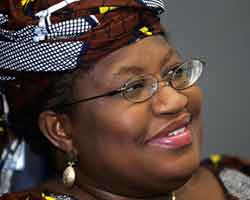
Dr. Ngozi Okonjo-Iweala is the Minister of Finance in the government of Nigerian President Goodluck Jonathan. She entered the post in August 2011 after serving for years as an official of the World Bank., a photo by Pan-African News Wire File Photos on Flickr.
Govt needs N7 trillion to complete 6,294 projects
Tuesday, 10 July 2012 00:00 By Femi Adekoya and Geoff Iyatse News - National
Nigerian Guardian
Okonjo-Iweala raises alarm over rising debt profile
WITH over 6,294 ongoing projects by 30 Ministries, Departments and Agencies (MDAs), the country would need about N7 trillion to complete its developmental schemes, the Budget Office has revealed.
The Federal Government yesterday said efforts to streamline the multiplicity of MDAs were on-going as the names of the review board members would be released within the next 10 days, noting that no new project would be accommodated in the 2013 budget.
Besides, the Co-ordinating Minister of Economy and Minister of Finance, Dr. Ngozi Okonjo-Iweala, disclosed at a consultative meeting with the organised private sector and civil society organisations on the Federal Government 2013 budget tagged “Charting the way forward for inclusive growth”, in Lagos yesterday that with the rising debt profile of the nation, amidst the Euro zone crisis, it may be difficult for the nation to get foreign aid if it slipped into another debt crisis.
She added that though the nation’s debt profile was sustainable when aggregated against the Gross Domestic Product (GDP) level, it might become unsustainable if the domestic debt was not monitored and reduced, noting that there was need to increase the foreign reserves to $50 billion and shore up the excess crude account from the existing $5.8 billion to $10 billion in order to be effectively shielded from another debt crisis.
The Director-General, Budget Office, Dr. Bright Okogu, noted that with over N404 billion already released for capital expenditure as at the end of the second quarter, with about 31 per cent implementation rate, some MDAs with large debts may not receive new allocations in the 2013 budget.
According to her, although efforts are being made to ensure that the sinking fund is effectively managed, with the nation’s domestic debt profile standing at N5.9 trillion, it has become expedient for the nation to slow down domestic borrowing and diversify its earnings as current interest rates continue to widen the debt net.
To this end, Dr. Okonjo-Iweala noted that the economic team has concluded plans to tighten loose ends in the 2012 budget, while efforts are being made to reduce the refinancing of the loans, even as loans by state governments are being closely monitored.
On their part, members of the organised private sector and civil society organisations noted that except government addressed the issues of multiple-taxation, poor infrastructure, high interest rates, inconsistency in policies and corruption within the public sector, it may be difficult to effectively implement the budget and enhance growth in the nation’s economy.
The minister said: “Debt ratios are reasonable at this time. Within the domestic level, it is worrying but there is a solution at hand. We are trying to decelerate the rate of accumulation of domestic debt by breaking the trajectory of borrowing so that Nigeria does not find itself in a dire situation.”
She continued: “Our fiscal policy has been loose in the last few years, but we need to tighten it now. We need to build up our reserves to about $50 billion. We are currently at about $37 billion as against $32 billion last year. Similarly, our excess crude account must be shored up from the present $5.8 billion to $10 billion.”
Explaining the rationale behind the scrapping of some MDAs, Okogu said that a multiplicity of over-lapping functions had been observed in the MDAs, thereby necessitating the need to enhance prudent management of public resources and minimise leakages and their sources.
Reacting to Okonjo-Iweala’s position on the growth strategy for the mid and long-term, the Director-General, Nigerian Economic Summit Group (NESG), Mr. Frank Nweke (Jnr.), noted that there was need for government to address the issue of profligacy in its institutions.
“Some of the issues that we are discussing are not new. They have been lingering for as long as six years. When the current GDP is aggregated against both the local and foreign loans, it is hardly sustainable. What have we done with the monies that we are earning from taxes and other revenue agencies? Policies have been abandoned.
“Fiscal deficits can only be reduced if the level of stealing can be reduced. The Bureau of Public Procurement is also culpable for some of the leakages in the economy. The drive for prudent management of resources will result in nothing if corruption continues unabated. The National Assembly has no business spending the money which they are spending as they have remained unaccountable. This is an act of fiscal rascality”, he added.
On its part, the Manufacturers Association of Nigeria (MAN) has urged the Federal Government to address key issues affecting the growth of the nation’s manufacturing sector.
According to its president, Mr. Kola Jamodu, certain incentives should be offered by the government to encourage the productivity of the key sectors of the economy.
“Investment tax credit should be initiated to reduce the infrastructure problem in the country. Manufacturers should not bear the burden of multiple-taxation after self-provided infrastructure, which the government ought to have provided. Doing business in the country has become increasingly difficult. All these issues need to be addressed,” he said.
On the issue of high interest rates charged by banks to the real sector, he noted: “I think the banking sector should be re-examined. The interest rates by the banks are too high. Despite the high capitalisation of the banks, the interest rates are still high. They need to be developmental in their approaches. There is the need to dialogue with the banks, especially as inflation rate has fallen.”
No comments:
Post a Comment